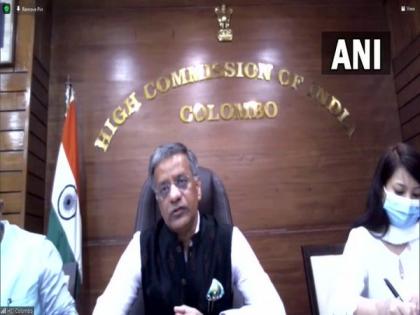Indian envoy Gopal Baglay denies reports of deployment of troops in Sri Lanka
By ANI | Published: April 8, 2022 01:38 PM2022-04-08T13:38:27+5:302022-04-08T13:45:02+5:30
Gopal Baglay, India's High Commissioner of Sri Lanka on Friday has categorically denied reports of deployment of the Indian Army in an economic crisis-ridden island nation and said that it was a rumour floating around since April 1.

Indian envoy Gopal Baglay denies reports of deployment of troops in Sri Lanka
Gopal Baglay, India's High Commissioner of Sri Lanka on Friday has categorically denied reports of deployment of the Indian Army in an economic crisis-ridden island nation and said that it was a rumour floating around since April 1.
The rejection came in a virtual press conference of the Indian High Commissioner.
On being asked over the deployment of the Indian Army in Sri Lanka, Baglay called it a rumour floating around since April 1, adding that the Commission rejected the claim right away, "it should not be spread and that it is baseless".
Sri Lanka is battling a severe economic crisis with food and fuel scarcity affecting a large number of the people in the island nation. The economy has been in a free-fall since the onset of the COVID-19 pandemic.
Sri Lanka is also facing a foreign exchange shortage, which has, incidentally, affected its capacity to import food and fuel, leading to the power cuts in the country. The shortage of essential goods forced Sri Lanka to seek assistance from friendly countries.
Discussing the economic crisis and Indian assistance to the island nation, Baglay said, "Indian help to Sri Lanka is quite significant. At a crucial time, India stepped up its efforts, we have come to aid and assist, and we have come up to support our close friend. Sri Lanka is India's closest maritime neighbour and is at the confluence of three important streams of India's foreign policy which are Vasudhaiva Kutumbakam, Neighbourhood First policy and the doctrine of SAGAR.
Vasudhaiva Kutumbakam is the phrase that finds its origin in the Maha Upanishad, essentially meaning "the world is family". It has been used to broadly convey India's ideal and liberal concept of global norms, themes of globalization, or global commons.
India shares its geographical boundary with Afghanistan, Bhutan, Bangladesh, Maldives, Pakistan, Nepal and Sri Lanka. India's policy towards its immediate neighbourhood is based on efforts to build peace and cooperation in South Asia. Its Neighbourhood First policy, accords primacy to nations in the periphery with a focus on encouraging trade, connectivity and people-to-people contact.
Meanwhile, through Security and Growth for All in the Region (SAGAR), India seeks to deepen economic and security cooperation with its maritime neighbours and assist in building its maritime security capabilities. For this, India would cooperate on the exchange of information, coastal surveillance, the building of infrastructure and strengthening their capabilities.
Baglay further said that both countries are civilizational twins and both share the joys and pains of each other.
"Not only geographically, and in terms of economic aspirations, being diverse democracies, but also from the cultural and civilizational point of view, India and Sri Lanka share good stand from thousands of years, in fact in essence they are civilizational twins," said Baglay.
He gave the example of the COVID-19 pandemic when both countries behaved like twins, feeling the pain of each other.
"When India suffered during COVID (peak) there were prayers from Sri Lanka, when Sri Lanka suffered due to COVID, India helped them with medicines and other essentials. We have been in close contact and discussions with the Government of Sri Lanka for post-COVID economic recovery," said the Indian High Commissioner.
Referring to the present economic crisis, Baglay said that in the same symbiotic manner, "India has come forward with humanitarian assistance to Sri Lanka. This complements the main elements in our relations."
"We have sent a rice consignment from India to Sri Lanka...Rs 18.5 thousand crores help provided to Sri Lanka. There will also be an investment in infrastructure projects in Sri Lanka," he added.
Further, he stated that both countries were focussing on currency -currency swaps; extending credit for fuel and food; energy security, and encouraging Indian investment in Sri Lanka to help its "civilizational twin".
"In view of discussions with Sri Lankan Government for post-COVID economic recovery, the focus has been on support for currency -currency swap; extending credit for fuel and food; energy security, and encouraging Indian investment in Sri Lanka," said Baglay.
Taking a dig at China, he said that the investment made by India in Sri Lanka is demand-driven and is transparent in nature.
"Our development model is very demand-driven and we don't have administrative overhead," said Baglay.
China has been expanding its presence in the Island-nation through its 'debt diplomacy. Sri Lanka is grappling with a big debt as well as China's growing dominance in the region.
Talking about Sri Lankan refugees, who are migrating to India, he said, "There are family ties on both sides, marriage ties. I do not see them as economic refugees."
( With inputs from ANI )
Disclaimer: This post has been auto-published from an agency feed without any modifications to the text and has not been reviewed by an editor
Open in app